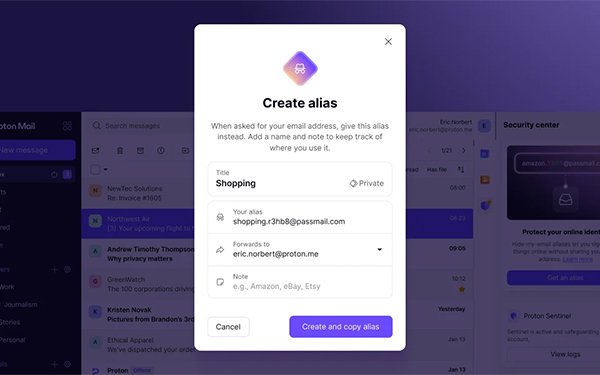
Marketers who see the email address
as a key identifier may be in for an unpleasant surprise.
Proton Mail, the email service that claims to protect personal privacy, is offering hide-my-email aliases that can frustrate spammers
— and marketers.
“Most online services are vulnerable to cyberattacks, and hackers are becoming more relentless,” the company writes in a blog post. “Once your
email address is in the wild, it can be added to spam lists or sold to marketers.”
Let’s not bother them with the fact that most legitimate email is permission-based —
we’ll do that later.
For now, Proton Mail claims that hide-my-email aliases are “unique, randomly generated email addresses you can provide instead of your real email address. You
can receive emails to these aliases within your Proton Mail account and reply without revealing your identity.”
advertisement
advertisement
Proton Mail adds that your email address
“is like your digital passport, a unique identifier for all the services you use online. But unlike a real passport, your email address is often publicly available for anyone to send you
malware, bombard you with spam, or track your behavior.”
Your digital passport? This is happening as Gmail and Yahoo have toughened up their rules, requiring DMARC and and/or other forms
of authentication. In April, bulk senders will have to provide a clear unsubscribe button and promptly honor all requests.
At the same time, email addresses are indeed being used a
key, first-party identifier as cookies go away.
Moreover, Proton Mail is exploiting a trend that already exists.
Among all consumers, 28% have separate accounts for
promotional emails and in general, 43.6% maintain two email accounts, while 17.6% are signed on for three accounts and 5.7% five or more, according to a recent study by Sinch
Mailgun.
"Many in our industry see hashed email as a cookie solution, yet consumers remain reluctant to trade emails for ads,” comments Patrick Gut, vice
president of U.S. at Adlook. “Email addresses are becoming more difficult to manage given PII concerns, dummy accounts, and beyond.”
What are consumers getting when they activate
Proton Mail aliases? We will quote this in full so you can see the attitudes behind it:
Online purchases: Companies love to build a profile of you based on your spending
habits. Providing an email alias protects you from being profiled and targeted.
Account creation: Whenever you create an account for an online service, you can provide a hide-my-email
alias to avoid being tracked or attacked by hackers after a data breach.
Newsletters: Email aliases make it much easier to unsubscribe from newsletters you no longer want (or
never wanted in the first place). Simply deactivate the alias.
Maybe it doesn’t pay to get riled about these cheap shots against marketing. But Proton Mail’s comments
ignore the fact that legitimate brands work very hard to maintain privacy: Email addresses are valuable precisely because consumers opt in. And companies make it easy for people to opt
out.
But there’s a profit motive here. Proton Mail states: “You can create up to 10 hide-my-email aliases with the Proton Free plan, or upgrade to
Proton Unlimited to create as many as you need.”
OK, we get it — they’re just trying to make money, like everyone else in the email
ecosystem.